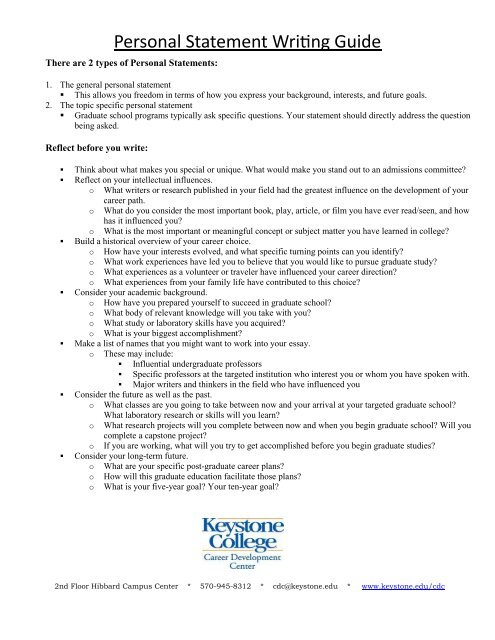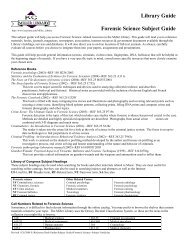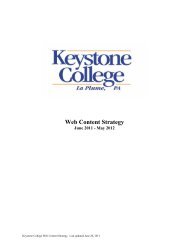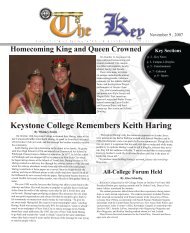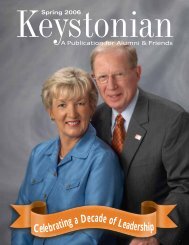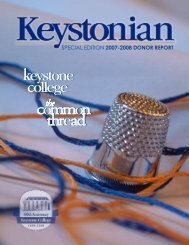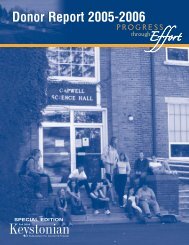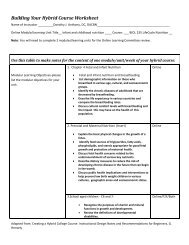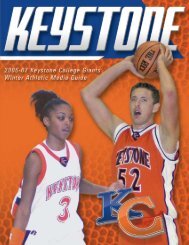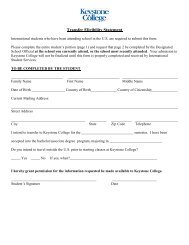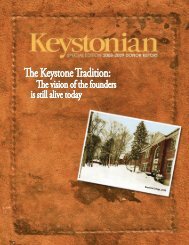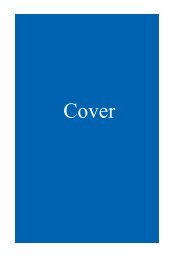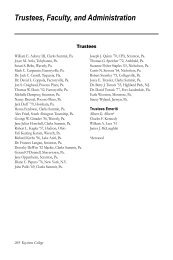Personal Statement Writing Guide - Keystone College
Personal Statement Writing Guide - Keystone College
Personal Statement Writing Guide - Keystone College
Create successful ePaper yourself
Turn your PDF publications into a flip-book with our unique Google optimized e-Paper software.
<strong>Personal</strong> <strong>Statement</strong> <strong>Writing</strong> <strong>Guide</strong>There are 2 types of <strong>Personal</strong> <strong>Statement</strong>s:1. The general personal statement• This allows you freedom in terms of how you express your background, interests, and future goals.2. The topic specific personal statement• Graduate school programs typically ask specific questions. Your statement should directly address the questionbeing asked.Reflect before you write:• Think about what makes you special or unique. What would make you stand out to an admissions committee?• Reflect on your intellectual influences.o What writers or research published in your field had the greatest influence on the development of yourcareer path.o What do you consider the most important book, play, article, or film you have ever read/seen, and howhas it influenced you?o What is the most important or meaningful concept or subject matter you have learned in college?• Build a historical overview of your career choice.o How have your interests evolved, and what specific turning points can you identify?o What work experiences have led you to believe that you would like to pursue graduate study?o What experiences as a volunteer or traveler have influenced your career direction?o What experiences from your family life have contributed to this choice?• Consider your academic background.o How have you prepared yourself to succeed in graduate school?o What body of relevant knowledge will you take with you?o What study or laboratory skills have you acquired?o What is your biggest accomplishment?• Make a list of names that you might want to work into your essay.o These may include:• Influential undergraduate professors• Specific professors at the targeted institution who interest you or whom you have spoken with.• Major writers and thinkers in the field who have influenced you• Consider the future as well as the past.o What classes are you going to take between now and your arrival at your targeted graduate school?What laboratory research or skills will you learn?o What research projects will you complete between now and when you begin graduate school? Will youcomplete a capstone project?o If you are working, what will you try to get accomplished before you begin graduate studies?• Consider your long-term future.o What are your specific post-graduate career plans?o How will this graduate education facilitate those plans?o What is your five-year goal? Your ten-year goal?2nd Floor Hibbard Campus Center * 570-945-8312 * cdc@keystone.edu * www.keystone.edu/cdc
Things to keep in mind:<strong>Personal</strong> <strong>Statement</strong> <strong>Writing</strong> <strong>Guide</strong>• Answer the questiono If you are applying to several schools, there may be questions in each application that are somewhatsimilar. Do not use a blanket statement for all applications; be sure your answer fits the question beingasked.• Be specifico Don't make general statements you cannot back up with specific reasons or experience. For example,do not say, “I know I will be a successful biologist,” unless you can support that with an experience orplan to become successful.• Find an angleo If you're like most people, your life story lacks drama, so figuring out a way to make it interestingbecomes the big challenge. Finding an angle or a "hook" is vital.• Realize the value of your opening paragrapho The lead or opening paragraph is generally the most important. It is here that you grab the reader'sattention or lose it. This paragraph becomes the framework for the rest of the statement.o One of the best opening paragraphs relates to an epiphany (the moment or event that you decided topursue your career goals).• Capitalize on your experienceso The middle section of your essay might detail your interests and experiences in your particular field, aswell as some of your knowledge of the field.o Be as specific as you can in relating what you know about the field and use the language professionalsuse in conveying this information. Refer to experiences (work, research, etc.), classes, conversationswith people in the field, books you've read, seminars you've attended, or any other source of specificinformation about the career you want and why you're suited to it.• Subjects to avoido There are certain things best left out of personal statements. For example, it is generally a bad idea toinclude references to experiences or accomplishments in high school or earlier.o Don't mention potentially controversial subjects (for example, controversial religious or politicalissues).• Do some researcho If a school wants to know why you're applying to it rather than another school, do some research toarticulate why you are choosing that particular university or program. If the school setting wouldprovide an important geographical or cultural change for you, this might be a factor to mention.o Demonstrate that you have read the course catalog carefully, researched the program, and consideredyour reasons for applying to this particular school.• Proofreado Be meticulous. Type and proofread your essay very carefully. Many admissions officers say that goodwritten skills and command of correct use of language are important to them as they read thesestatements. Express yourself clearly and concisely.o Less is more in a personal statement.• Avoid clichéso A medical school applicant who writes that he is good at science and wants to help other people is notexactly expressing an original thought. Stay away from often-repeated or tired statements.


